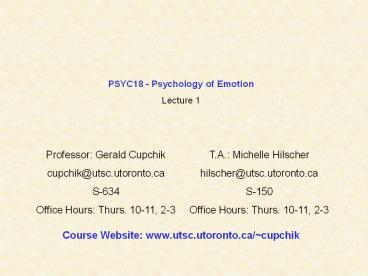PSYC18 - Psychology of Emotion - PowerPoint PPT Presentation
Title:
PSYC18 - Psychology of Emotion
Description:
Existential concept of thrownness we are thrown, as if by accident, into particular worlds. ... Meaning-in-the-world (Existential) Life Episodes ... – PowerPoint PPT presentation
Number of Views:115
Avg rating:3.0/5.0
Title: PSYC18 - Psychology of Emotion
1
PSYC18 - Psychology of Emotion Lecture 1
Professor Gerald Cupchik cupchik_at_utsc.utoronto.ca
S-634 Office Hours Thurs. 10-11, 2-3
T.A. Michelle Hilscher hilscher_at_utsc.utoronto.ca
S-150 Office Hours Thurs. 10-11, 2-3
Course Website www.utsc.utoronto.ca/cupchik
2
We can look at the psychology of emotion from
different viewpoints
- The person in the street wants to know
- How can I be more/less emotional?
- Are some people generally disposed to be
more or less emotional? - How can I learn to recognize the
emotional states and experiences of
others? - How can I predict, explain, or
understand the emotions of others?
3
We can look at the psychology of emotion from
different viewpoints
(2) The research psychologist wants to know How
can emotion be a phenomenon unto itself while at
the same time being related to the mind (i.e.,
thought) and body (i.e., motor expression and
somatic response)? What is the evolutionary
function of emotion? Are there individual
differences in emotional style? What is the
relation between emotion experience and emotion
management? What is the relation between
expression and experience? What is the difference
between expression and impression? What are the
relations between feeling and emotion?
4
We can look at the psychology of emotion from
different viewpoints
(3) The clinical psychologist wants to know How
to help people deal with unconscious or repressed
emotions. How to help people deal with loss. How
to help people become more integrated and
productive. How to help people sleep better, deal
with anxiety, find love, etc.
5
Lets start with the first major challenge To
understand emotion as a distinctive experience
while at the same time trying to understand how
it interacts with cognitive (i.e., thought) and
bodily processes.
- Worlds
- Ludwig Binswanger proposed three worlds
- Eigenwelt personal and private (with ourselves)
- Mitwelt social world (with others)
- Umwelt organic and physical world (the world
around)
Existential concept of thrownness we are
thrown, as if by accident, into particular worlds.
6
- Life Themes
- Adaptation (Darwin)
- Meaning-in-the-world (Existential)
Life Episodes These are events that take place
in these worlds as we struggle with these life
themes. Personal Life Narratives We have
experiences and feelings about our life-worlds
and events that take place within them. These can
be expressed in the forms of narratives or
stories in terms of which we define ourselves.
These stories comprise facts and interpretations
of these facts which we take to be true about
ourselves and our worlds.
7
- Layers
- Imaginelayers in a cakeof rock in the earthof
the atmosphere. - You are in a lifeactually many lives at once.
- You are in a worldactually many worlds at once.
- Four Fundamental Layers
- Noetic includes all mental processes and
different forms of knowing (perceptual,
intellectual, emotional) - Organic includes all biological processes
- Physical includes all physical processes
- Social includes all social and cultural
systems. - These layers have their own unique properties but
also interact with - each other.
8
Perspectives Paradox of one body and many
selves Looks like one body and this implies one
self illusion of unity. But in fact there are
many selves in that one body. There are many
layers in the single person. Fromm spoke about
division within the self where people are not
sure how to integrate their many
selves. Interface of Mind and Body (problem of
consciousness) Consciousness lies at the
sentient boundary between stimulation from the
outside world and from the inside world,
physical, cognitive, and affective during a
particular period of time.
9
- How do we see ourselves?
- Are we objects or processes? (Are we static or
dynamic?) - Can we change or are we burdened by our personal
histories? - Literal viewpoint (externalized view)
- As objects with featuresgradesstatusmoney
- (Closed process)
- Ironic or metaphorical viewpoint
- See ourselves in context, changing
- (Open process)
- Shifting viewpoints (engaged versus detached)
- Engaged (absorbed in our experiences)
- Detached (outside of our experiences)
- Can we unify these viewpoints?































